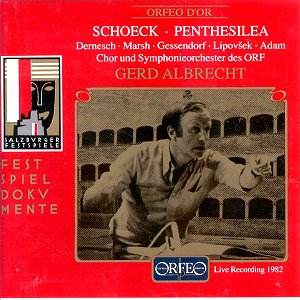The plot of Schoeck’s Penthesilea follows
von Kleist's grim drama. The story and atmosphere are akin to
the murderously sinister material used by Fibich in his Hippodamia
melodrama and the opera Sarka (both recorded on Supraphon).
Schoeck shortened the text of the play but resisted the temptation
to add anything. The work was premiered in 1927 at the Dresden
Opera.
The plot: The Amazons, ruled by warrior queen
Penthesilea, back the Trojans against the Greeks. The queen is
thrown from her horse by Achilles who spares her. Penthesilea
waits for the Greeks. She encounters Diomedes. Achilles appears
and admits his love for Penthesilea. Penthesilea, in true Amazon
fashion, can only love a man she has defeated in battle. Achilles
successfully persuades her by surrendering. They celebrate their
love. They argue over to whose kingdom they shall return and the
queen suffers the dawning of doubts. The battle between the Greeks
and Amazons flares afresh. The Amazons gain the upper hand. Achilles
and his host retreat. The Amazonian high priestess condemns Penthesilea
for betrayal of her people in the cause of Achilles' love. Penthesilea's
love rots into hate. When he comes to her with the intention of
declaring his unconditional love for her she wounds him with an
arrow and sets her dogs on him. They tear him apart. Learning
the truth about Achilles’ feelings she collapses into madness
and at his funeral flings herself across his corpse and dies.
Schoeck’s approach is highly individual. The
soundworld stands out from his other operas. The orchestra includes
two pianos, only four solo violins, a disproportionately large
number of violas, cellos and double basses, no harps, no bassoon
only a contra-bassoon, ten clarinets, four trumpets in the orchestra
and three extensively used trumpets on stage. This is the toughest
of the Schoeck operas. Schloss Durande and Massimilla
Doni are each much more approachable in a hyper-romantic mode
related to the work of Schreker and Zemlinsky. In Penthesilea
Schoeck takes his lead from the priests of dissonance softening
the elbows and angularities with a misty aureole.
The voices in this 1982 production are generally
good though all show signs of some stress. Helga Dernesch acts
her role and has a fine sprechgesang voice. Her singing however
is troubled with vibrato (tr.7) and time has stripped some of
the gold from her tone. The choral contribution is determined
with plenty of heft. Listen to tr.4 [2.30] where victory song
of the male chorus has no shortage of ‘grunt’. The solo voices
closely recorded to the detriment at times of the orchestra.
The writing is packed with marvellous effects
and incidents. Note the conveyed initmacy of the dialogue among
the Amazonians. At trs. 6 and 7 there is a much more lyrical dark
and deep quality. Moonlight shifts and trickles through the textures
of the four solo violins in a way perhapos learnt from Schoeck’s
study of the score of Rosenkavalier. There is threat too for example
in the quiet underpinning glint and glitter of the two pianos
(tr.12). Violence erupts as in the storming off-beat batttle music
of track 3 and in track 13 with both screaming and battering percussion
and the malevolence of raging saw-toothed fanfares. Let slip the
dogs of war indeed.
Gerd Albrecht is an under-appreciated conductor.
Surely his neglect at an international level is due to his unswerving
commitment to the unfashionable late-romantic operas of Schreker,
Zemlinsky and Schoeck. This Salzburg Festival production was not
his first recorded foray into Schoeck. He is the conductor of
the Koch-Schwann recording of Schoeck's masterpiece Massimilla
Doni (1934-35). He can be seen in the same crusading light
as Norman Del Mar and Michel Plasson.
Presentational strengths of this set include
generous tracking. There are seventeen. Weakness (for anglophones):
German libretto printed in full but no translation into English.
Full notes in German and English by Gottfried Kraus and the conductor.
English-only synopsis.
This was a joint production involving ORF, the
EBU and the Festival Committee. Support also came from the Pro
Helvetia Foundation and the Othmar Schoeck Society. After the
Salzburg performances Penthesilea was produced by eleven
opera houses.
The recording has its imperfections (listen to
the coughing in tr.5) but it captures the essence of this savage
blitzkrieg of a piece.
Rob Barnett

![]() ORF-Chor and ORF-Symphonieorchester/Gerd
Albrecht
ORF-Chor and ORF-Symphonieorchester/Gerd
Albrecht ![]() ORFEO D'OR C 364 941
B [79.59]
ORFEO D'OR C 364 941
B [79.59]